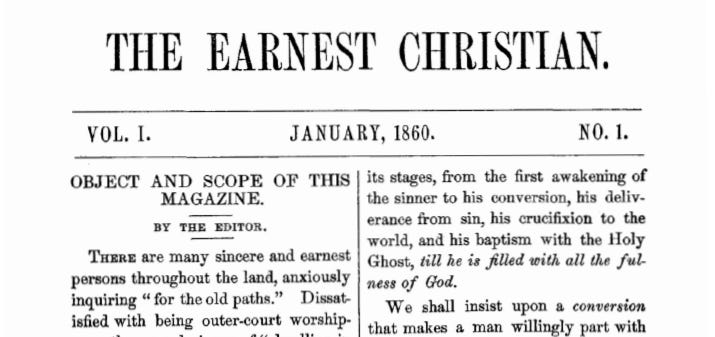Namesakes
B.T. Roberts, The Earnest Christian, and Who Is Catechizing Us?
In January of 1860, B.T. Roberts and other concerned Christians launched the magazine The Earnest Christian with the aim being to “set up the Bible standard of religion” in the “catholic spirit” with an “uncompromising advocacy of righteousness, peace and joy in the Holy Spirit”.1 Your first thought in that, as is mine, is likely something like this: no one talks like that anymore. I imagine in Robert’s day many thought the same thing. Roberts and the other contributors to The Earnest Christian were taking upon themselves the daunting task of speaking into a culture they saw as one needing spoken into explicitly with the Christian message. They saw a distinct lack of revival and influence of the Holy Spirit in their land, a land on the brink of war.
It is for this reason I have chosen to borrow the namesake from The Earnest Christian, well, at least the Earnest portion. In choosing Wesleyan as the follower, I am recognizing that this small publication, whatever it may become, will never be the fullness that the Christian was. This is but a mere token, a phase, comparable only in part of a whole, just as the Wesleyan theological stream is a part of a whole: the wider stream of Christian tradition. So, I recognize their legacy and honor it, and seek to - in whatever small part I can - speak into the church and culture in any way possible with the help of the Holy Spirit to advance the cause of Christ as they did. I will at times try to draw from it and utilize the articles in it to speak into the issues of today at times, but not exclusively, the majority of the content will be original content. There are even points of contention between Roberts and I, especially in the field of economics. No matter what, I will strive to be accessible, this is not a publication for just the theologian and academic. In the future if (big if) this attracts interest, I will seek to have on other authors, subscription options, and possibly other fun things.
This magazine is also not simply for Wesleyans, that is just a descriptive of its founding and convictions of its founding author. In particular, as was Robert’s concern in his day, the land is in trouble and needs speaking into, it desperately needs the Gospel of Jesus Christ to frame the interactions and response of the believer with the land around it. For too long now Christians have wallowed in their cultural capacity, lacking theological convictions grounded in orthodoxy, forfeiting our influence in dangerous and negligent ways. The result is this: we, as Christians in the land known as the United States, have been all too ready to shift with the culture and now it is catechizing us, and we are simply letting it.
I promised accessibility, so let’s define our terms and what I mean here. A catechism is a summary of beliefs, often in question-and-answer format. Christians have been using them for centuries to instruct new believers and children in the basics of the Christian religion. In America, this has largely fallen out of practice, especially in the evangelical church but also in Christianity more broadly. Somewhere along the line it fell out of practice in the family unit as families outsourced it to the church in the form of youth groups and brief membership classes.
While youth groups and membership classes have their function, replacing catechism entirely falls outside their capabilities and the scope of their mandate. Youth pastors simply cannot be expected to be responsible for the daily Christian education of their students, nor can the ever-increasing brevity of membership classes effectively instruct converts in the faith. In American individualist fashion we often instruct new believers to buy themselves a study Bible in our favorite translation with study notes by our favorite preacher and go at it alone. (Let me be clear in saying that individual Bible study is not a bad thing, nor are study Bibles, and the Holy Spirit is active in the study of Scripture. But we are remiss to think this individualistic approach replaces active instruction.)
As such, an empty well has developed as no one has been answering the questions about what we believe and why it matters. The well, meanwhile, is being filled with what the world pours into it in the Church’s absence. Public schools, the media, the entertainment industry, and worst of all social media have been effectively catechizing Christians for generations now with an ethic that is increasingly opposed to basic Christian ethics. Catechism has been occurring, but not Christian catechism. This is one of many problems we face, and we find ourselves in a similar place as Robert’s did in his day. To quote one anonymous author in the first edition of The Earnest Christian in an article entitled “Where Are We Drifting?”:
[The] fashion is changing fast. What mean those towering steeples? Is it to vie in stateliness with ambitious neighbors? Go inside. What is the minister trying to do? To win applause or sinners? Which? Where is the poor man's seat? Who has monopolized the gallery? and who presides at the worshipping machine? Who welcomes the stranger, and tries to win him to Jesus? Where are the members? Surely these cannnot be Methodists, so thoughtless, sleepy, and so gaudily attired. Where are the Methodists? Where? the answer comes. And where are we drifting?2
Replace “Methodist” with Christian and you have an apt and prophetic description of the church of today.
Roberts, B. T. A.M., Editor, "The Earnest Christian: Devoted to the Promotion of Experimental and Practical Piety Volume I" (2017). Books. 30.
https://place.asburyseminary.edu/freemethodistbooks/30. pp 2.
An Old Methodist (Anonymous), Where Are We Drifting in "The Earnest Christian: Devoted to the Promotion of Experimental and Practical Piety Volume I" (2017). Books. 30.
https://place.asburyseminary.edu/freemethodistbooks/30. pp. 31.



